Reputation Management: Why it Matters and What to Do About It

You can't erase most content from the Internet.
If you haven't been on the wrong side of this fact, consider yourself lucky. Whether it comes from regrettable images or content on social media, a comment taken out context, or a negative review of your business, millions of people have felt the wrath of the internet's permanency. And without managing your online reputation, you could be next. In today’s digital age, reputation management should be a priority for everyone. It's easier than ever to search for incriminating information, or for anonymous people to leave disparaging comments in public settings. Unfortunately, a failure to control what shows up when someone searches for you can have serious implications for your business, career, and personal reputation.1, 2

Reputation management isn’t about advertising or promotion. It's a way to influence how people perceive you or your business. The process can be time-consuming, but in the end you’ll have strengthened your personal or professional brand.
What's Inside
This guide will take you through some of the most effective steps to improve your online reputation. First, it will define reputation management, and explain why it's important for small business owners, job seekers, and students. Next, it will provide tips to improving your online presence, including how to respond to negative reviews and clean up your social media profile. By the end, you'll be equipped with the tools to fortify your online brand. Let's get started!
What is Reputation Management?
Have you ever searched online for a business or someone you're about to meet? You're not the only one. According to Reputation X, 65 percent of online users consider the Internet their most trusted resource for information about people and businesses. Today, most personal or professional interactions begin with a simple internet search. But because of the volume of shared content and images, we have little control over what shows up in Google or Bing. Regardless of whether you search your name or business and see content you wish wasn't visible, it's time to invest in your online reputation!
Luckily, a proactive reputation management strategy can put you in charge. Developing a positive presence online and on social media takes several steps, but these efforts will help build your brand, and establish relationships with current and future clients.
Reputation Management for Small Businesses
Think back to the last time you searched online to hire a home service provider. Maybe you were looking for a plumber to fix a clogged drain or a roofer to repair weather-damaged shingles. Did you click on the first result and never look back? Probably not. Instead, like many other online users, you likely looked through several websites, read online reviews, and compared companies before making a decision.
Online reviews are an important part of today’s business culture.
74% of people consult Yelp when looking for a home service provider
86% of people would pay more for services from a company with higher ratings and reviews
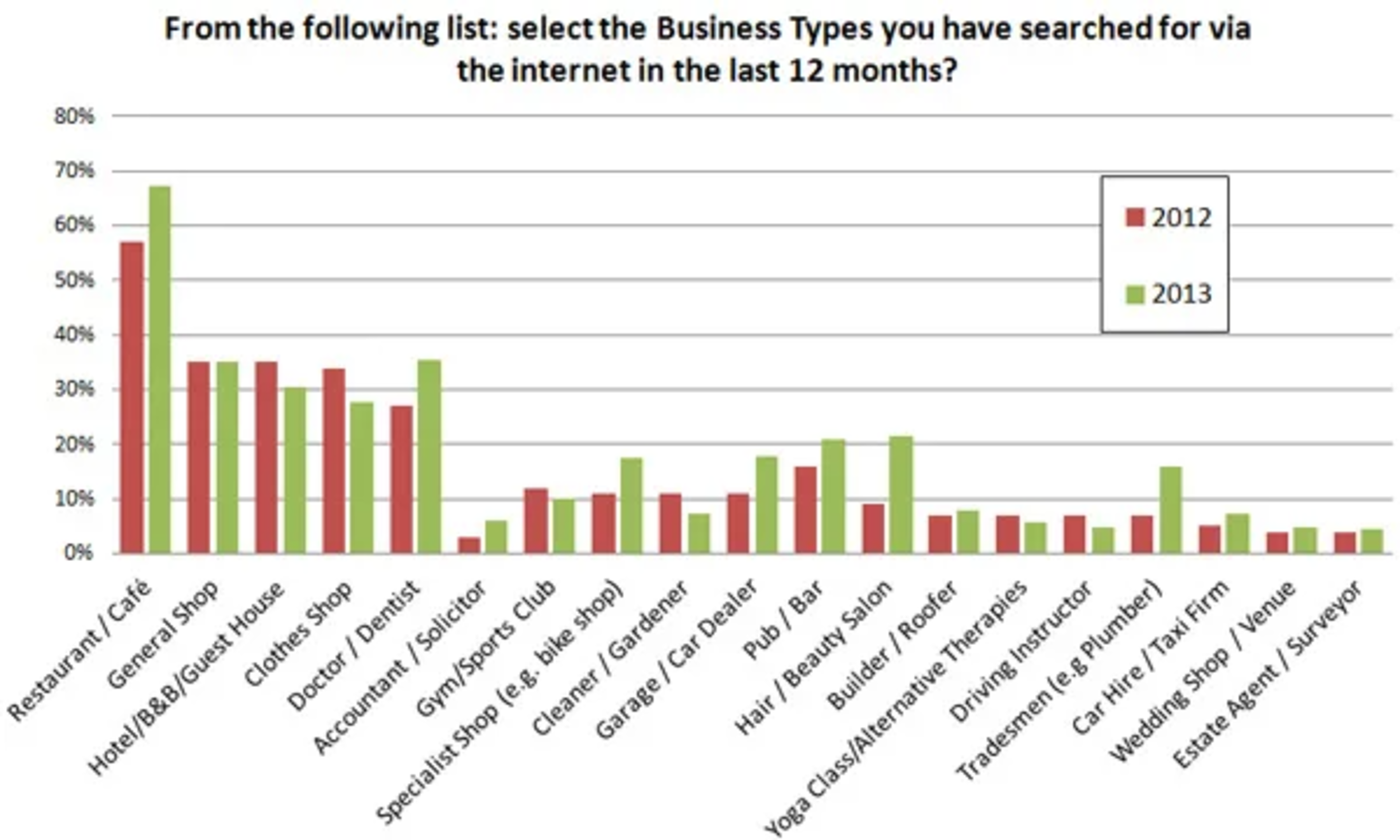
Source: BrightLocal[/caption]
What does this mean for a local business owner? Managing your company’s online reputation has never been more important. Your business needs a well-maintained web presence because it’s how customers compare you to the competition. It allows clients to understand what your business is all about, and has the added benefits of:
Brand management: What do you want people to know about your company? If you want to control the online opinion of your business, you need to invest in your online reputation.
Building customer trust: A positive online reputation will lead to increased customer trust. You’ll develop credibility in your field, and that authority and expertise will increase your business. The more customers trust you, the better your online reviews will be, which can lead to more opportunities to grow.
Improve Your Online Reputation
If your business is just starting out, or you are new to online reputation management, the process of getting started can seem difficult. But it’s not. There are many easy ways to get started.
General Sites
Start by creating a business profile on general review sites like Yelp, Citysearch, and the Better Business Bureau. These sites host reviews of many businesses and are city-specific, so you can connect with customers in your area.
Service Specific Sites
Branch out to sites that review just your field of business. For example, Houzz and Angie’s List offer reviews for home services. Avvo and Super Lawyers rate and review lawyers.
Local Forums
Sites like Nextdoor and City-Data bring local users together on message boards and forums. This is a great way to reach customers in your area and establish yourself as a business expert in your city. You’ll also start to see trends in what people are talking about, so you can adjust business plans to the market.
Know what’s allowed on each site
Before you begin posting online as your business, be sure to read the terms of service for each individual site. For the most part, incentivizing reviews is seen as unethical and dishonest. 5 So is blasting the competition. To develop your online reputation, rely on your business’s strengths, your loyal customer base, and your integrity. Don’t compromise your reputation with shady behavior on review sites as it is illegal and downright unethical.
How Do You Maintain a Strong Reputation?
Bad reviews happen, but in today’s online world, they can cripple your business if you don’t do your best to remedy the problem. Online reputation management lets businesses overcome negative reviews, learn from mistakes, and continue to thrive. Let’s take a look at a step-but-step guide for maintaining a solid online reputation.
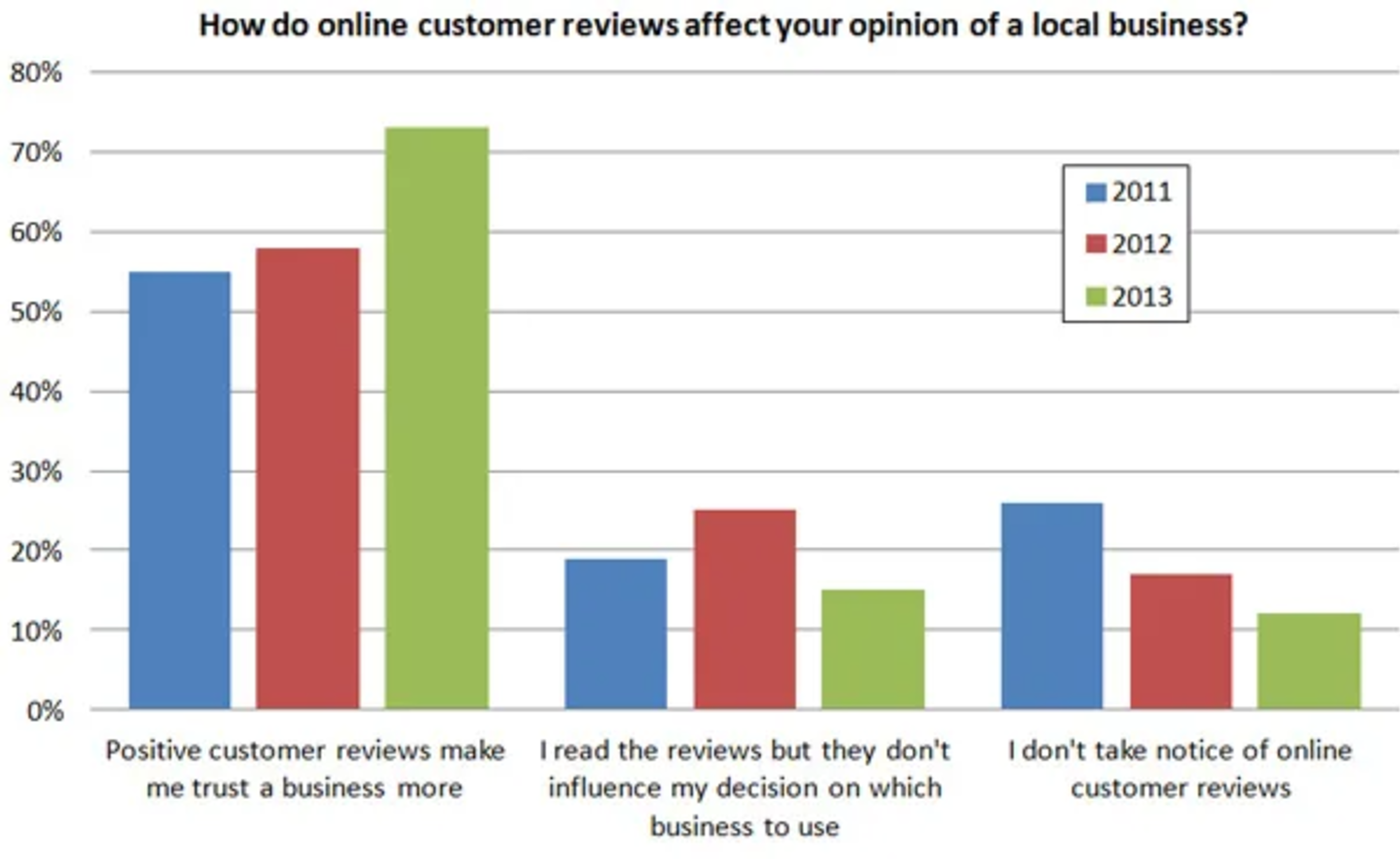
Source: BrightLocal[/caption]
Examine your current reputation: Search for your business on Google, Yahoo, Bing, and MSN. Try search terms like “(business name) (city name) reviews” or “(city name) (business type) reviews.” Create a spreadsheet to track each site that mentions your business. Indicate whether the review was positive, negative, or neutral.
Respond to positive reviews: 90% of people say a positive review impacts their online buying decisions.6 Respond to as many positive reviews as possible. Start by thanking the reviewer for their review and their business, address any negative feedback, and encourage them to shop again. Keep your post friendly and professional. If you want to offer a thank-you deal, share the discount offer privately, not in the review response itself.
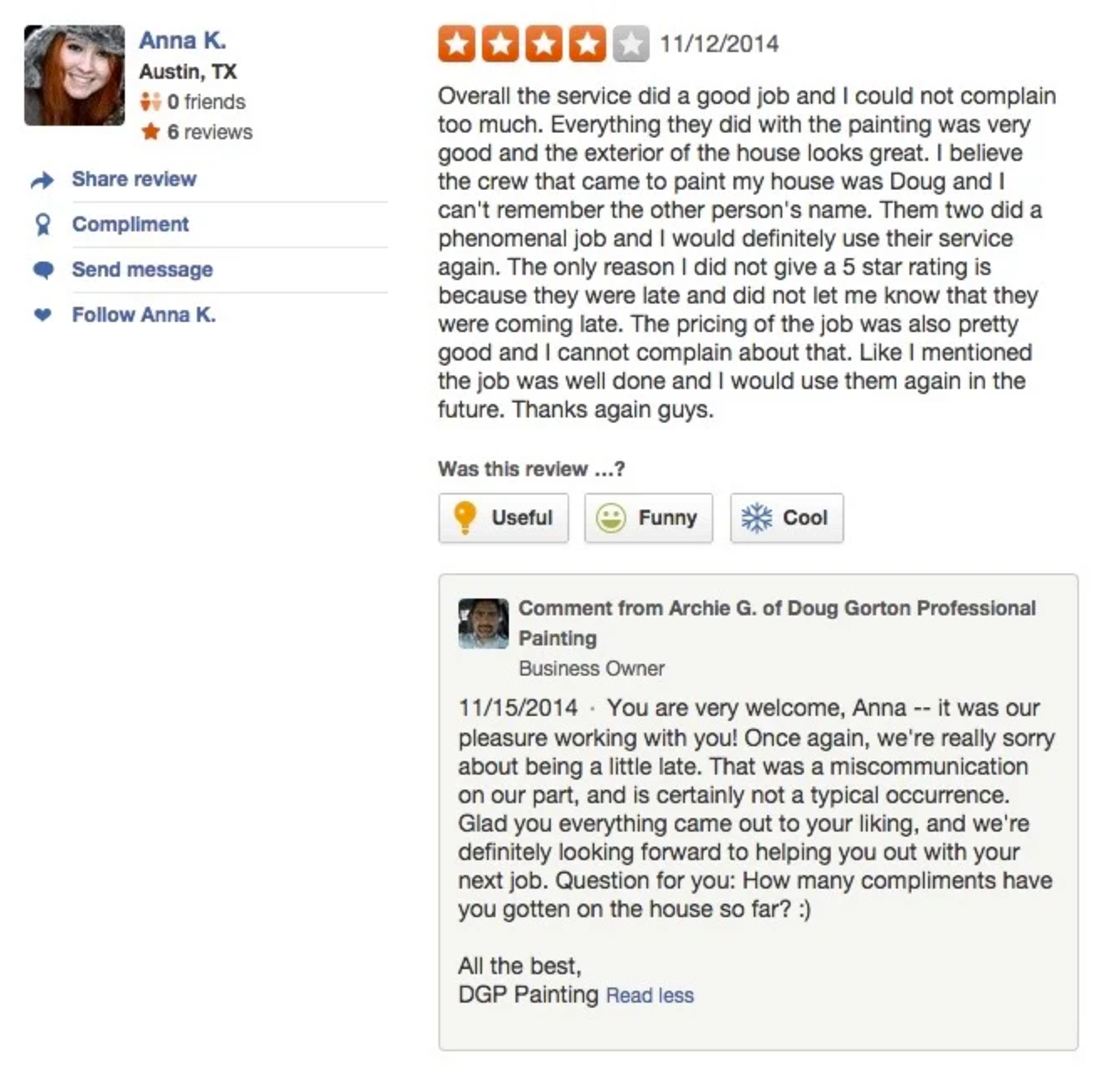
Respond to negative reviews: Negative reviews are a part of the online business world, and how you respond reflects the brand you’re building. Negative reviews can stir emotions and feel threatening, so make sure you’re in a positive mindset before responding. First, determine what is causing the reviewer to feel upset with your service. If the reviewer’s complaints are valid, own up to your mistakes. If the review is incomplete or missing facts, politely fill in the gaps. As always, keep your tone polite and professional. Respond to reviewers like like you are speaking in person, and avoid jargon or skirting the issue. Apologize when necessary, and attempt to repair the relationship by inviting the customer back for a better experience.
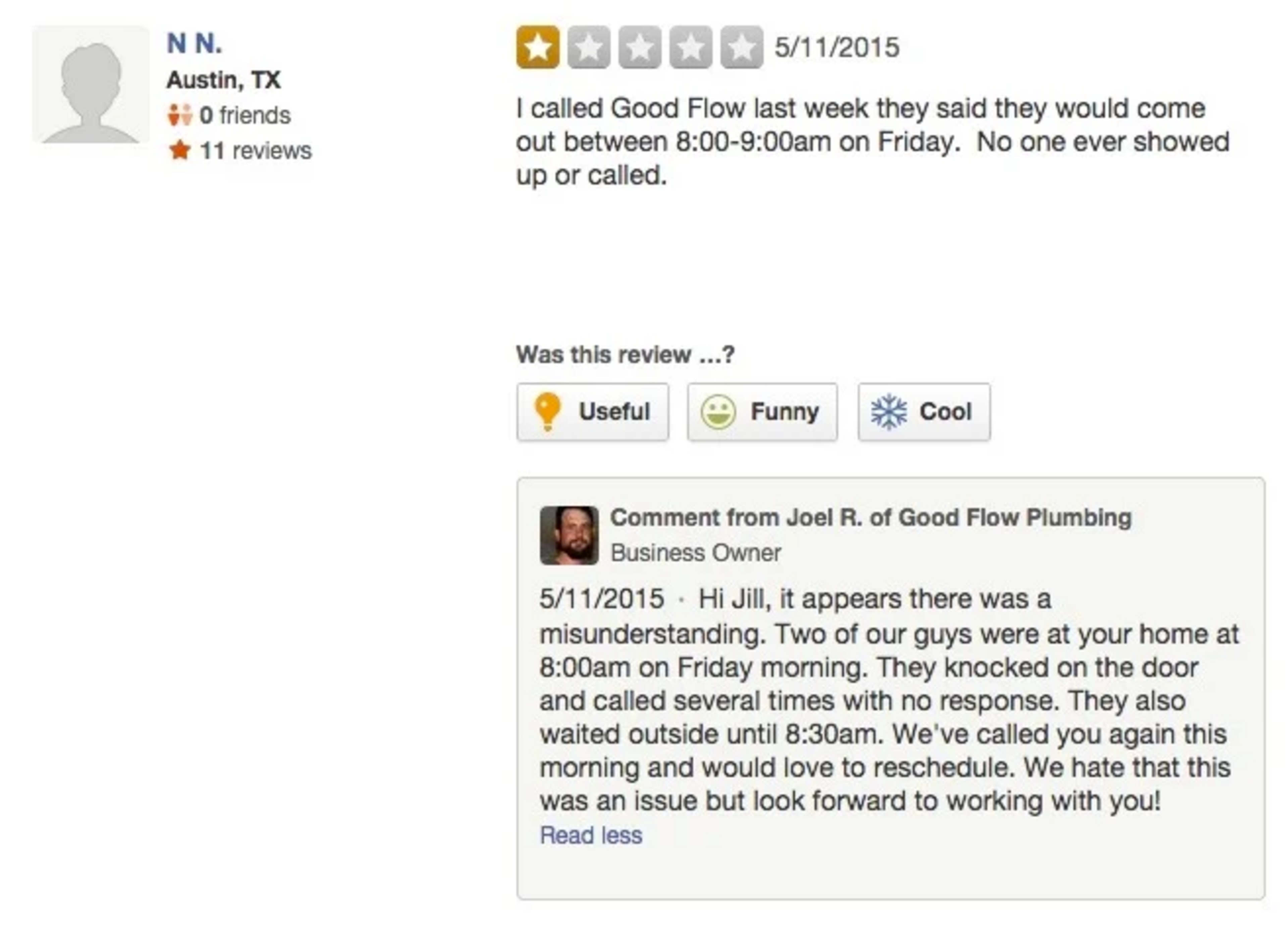
Remove dishonest reviews: At some point you may come across a review that is downright dishonest. Maybe a reviewer will claim you never showed up for an appointment, but they never made one. When you find a dishonest review written about your business, check the site’s Terms. If the review violates the terms, privately contact the reviewer and ask that it be removed. If they refuse, follow the steps toward reporting false reviews for each individual site. If necessary, publicly comment on the review to provide the facts. Be sure to remain polite and professional.
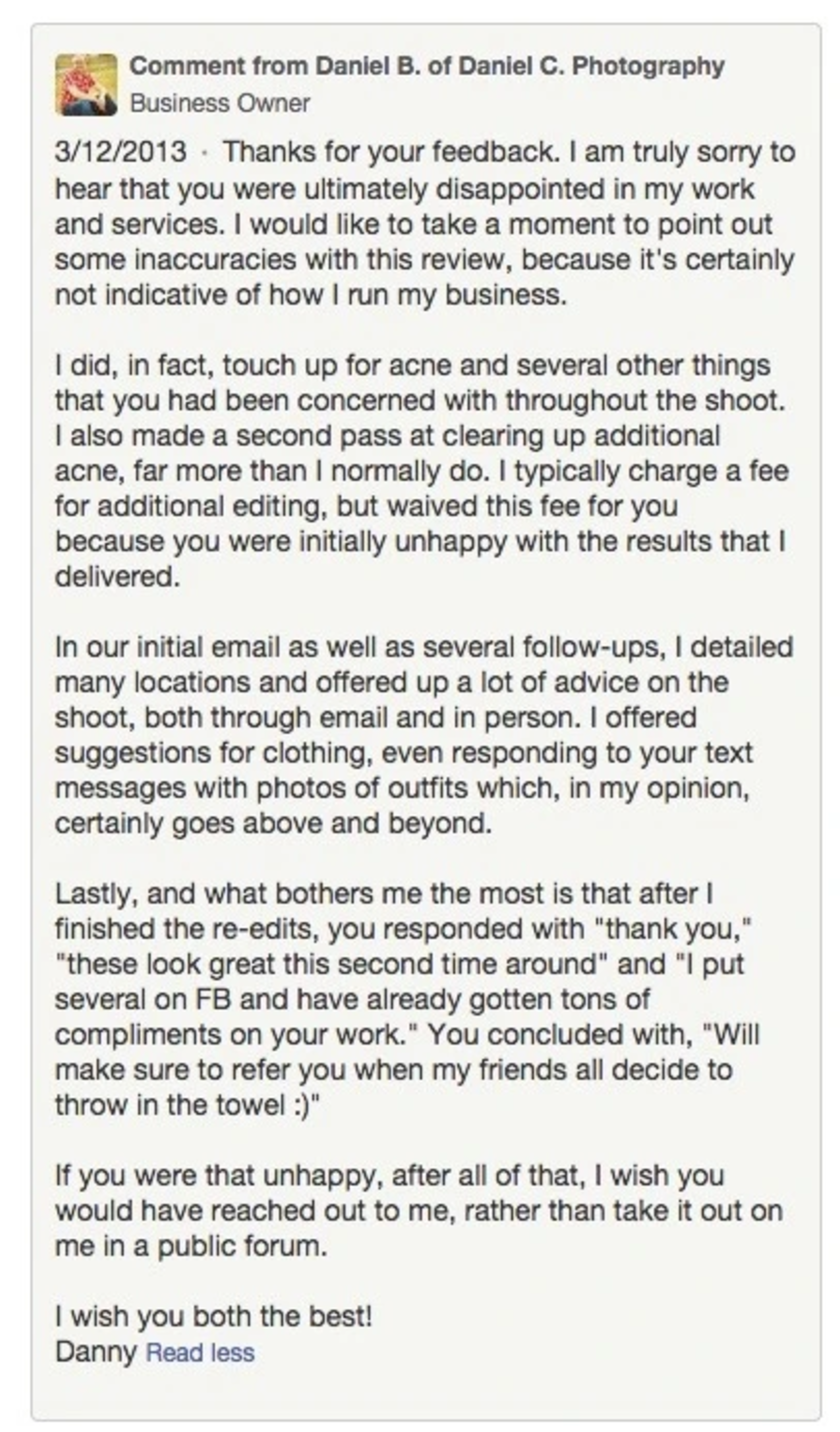
Get more reviews: You shouldn’t incentivize reviews, you can still ask for them. If you have a loyal customer base, ask them to spread the word across different review sites. Make it easy for your customers to leave reviews by emailing them with a direct link to where they can write one. Whitespark offers free review generator handouts that walk clients through writing a review for your business. Also, consider adding badges to your website with links to review pages.

Spread the Word
Once you’ve strengthened your online reputation, don’t be shy about sharing your positive reviews and recommendations. There are many ways to spread the word and continue to build online credibility.
Stickers and badges: Review sites offer stickers to businesses who meet certain criteria. When you receive the sticker in the mail, proudly display it near your front door where people can see. In addition, electronic badges can be added to your website and shared on social media accounts, advertising your great service.
Search engine optimization (SEO): Because most customers don’t look past the first results page when using a search engine, you need to invest in some basic SEO for your website. Check out Expertise.com’s guide to SEO for small businesses.
Social media: Create accounts on major social media sites, such as Facebook, Twitter, LinkedIn, Instagram, and YouTube. Keep your business name consistent across all platforms, so you’re easily identified by customers. Interact with customers frequently, so you can continue to build relationships. If customers contact you via social media with feedback, respond in the same way you would on a review site.
Blog: Let your customers know what’s happening with your business on your website. Blogs are a great way to develop the voice of your business, and establish yourself as an authority in your field. You can take the time to publically comment on certain reviews, or explain changes you’ve made to the business in response to customer feedback.
Ultimately, your online reputation reflects the quality of your product or service, and how you act in person. Make an effort to participate in your community and brand yourself as an expert.
Whether you choose to start a Meetup group for people in your industry, support local charities, speak at conferences, or anything else, working with your community will help establish a personal connection with the people who write online reviews.
Reputation Management for Students and Job Seekers
Today, many college recruiting teams search online to learn about applicants. For students and job seekers of all ages, this means you should invest in your online reputation like it's a final exam. Given the competition for admission to top-rated universities, you can't risk an inside joke or compromising image to hurting your chances.
The same applies to job seekers, especially young employees. In April 2015, unemployment for 20-24 year-olds was 9.6%, almost double that of any older demographic. The struggling economy has forced many companies to cut training budgets and entry-level jobs, making it tougher than ever to get a foothold in the working world. A clean online reputation can make all the difference.
According to a CareerBuilder.com survey of more than 2,300 hiring managers:
45% rejected candidates after finding content about drinking or drug use
28% rejected candidates after finding discriminatory comments
Fortunately, it only takes a few steps to avoid being part of these statistics. First, search for yourself in Google or Bing. Whether you see unprofessional content from social media, or content from somebody else with your name, here are a few tips to help you better control the search results.
Create a LinkedIn account: LinkedIn is a social media platform designed for professionals and job seekers, and is an online extension of your resume.
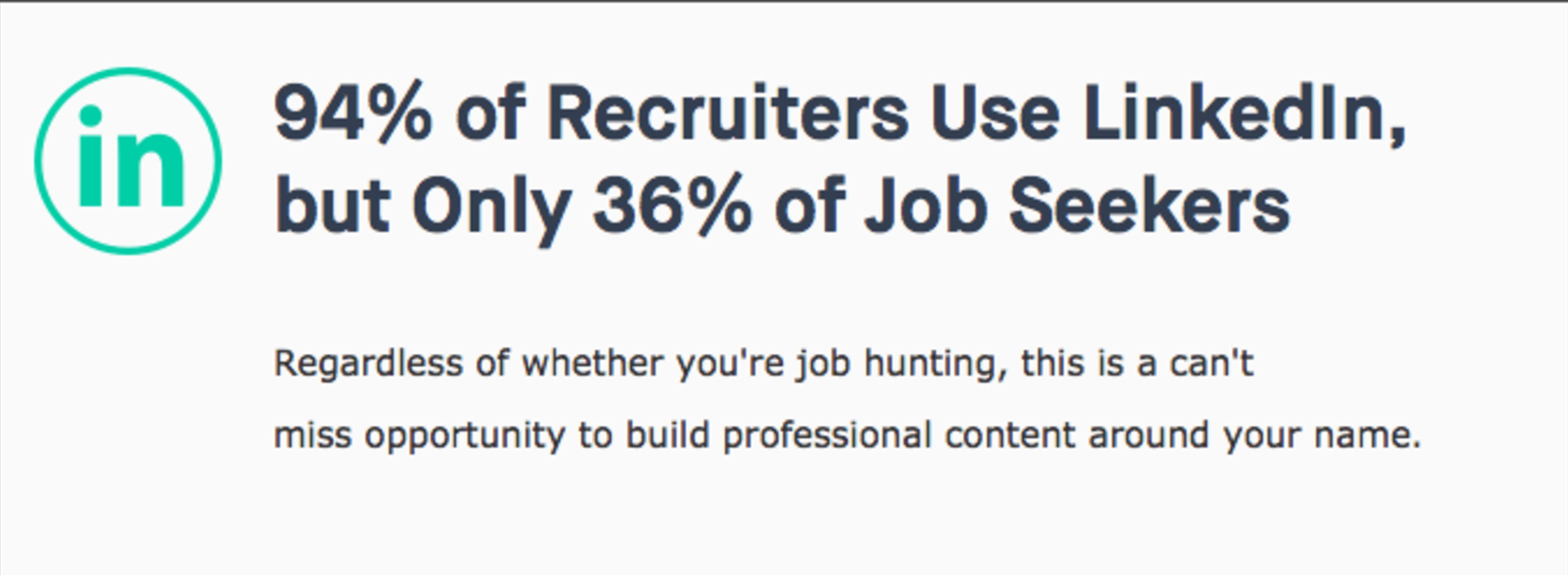
Build a personal website: A personal website is another opportunity to build professional content online. If you are a designer, writer, or artist, you can create a portfolio to share your work. You can buy a domain for a small annual fee, or build a free webpage with Blogspot, Wordpress, Tumbler, or many other websites. However, for long-term reputation management, it's worth buying the domain of your full name, preferably firstlast.com or first-last.com.
Update your privacy settings: This is a quick and easy fix to limit the visibility of your social media content. Create new settings so only your inner circle can see content, and if possible, restrict search engines from linking to your social media profile. Many social media platforms frequently change their privacy settings, so check back often to make sure your content stays private.
Remove unprofessional content: Even if you've updated your privacy settings and blocked your profiles from being found through search engines, you may one day connect on social media with a coworker, alumnus, admissions officer, teacher, boss, or client. To avoid being at the mercy of an HR team or academic disciplinarian, remove any content that would be considered unprofessional if shared in an application, resume, or workplace computer. If you are tagged in any regrettable images owned by someone else, request that they delete the pictures.
Avoid over-sharing: Now that you're aware of the risks of posting unprofessional content online, it's time to establish better habits. Regardless of privacy settings, operate online with the assumption that everything can be accessed by an employer or admission officer. Stay offline when under the influence, and avoid disparaging your school, job, coworkers or classmates.
In many situations, you cannot remove content from the Internet, so your best strategy is to create new content that will push the questionable content off the first page of Google or Bing search results. The process can be time consuming, but if it makes the difference between accepted and rejected, it's well worth the effort.
Resources
After reading this guide, you may be thinking the task of creating and maintaining an online reputation is too much for a small business owner. If you’ve tried and feel overwhelmed, there are many companies to do this work for you. Reputation management firms such as Reputation Defender and Integrity Defender offer plans for businesses, and usually focus on removing negative content and replacing it with more favorable information about your business. Consider the following before hiring a reputation management firm:
Cost: These types of firms can charge hundreds or thousands of dollars.
Urgency: Is your online reputation so tarnished you need it fixed now? You don’t need to hire a firm to remove a handful of negative Yelp review. But if a negative review video of your business goes viral, you might want to consider an agency that can devote several people to cleaning up your online image.
Accountability: If you feel a sense of loyalty to your brand, you should consider being the person who reads and responds to reviews. Knowing what your customers like and don’t like will keep your business grounded. Allowing an outside company to take over contact with customers may distance you from your local client base.
If you decide to handle reputation management in-house, you’ll find a variety of tools that will help make the task easier:
FindMeOn links all of your online accounts together. The site offers identity verification so that your customers know the account is real.
Naymz is a reputation management tool and a review site all in one. It provides tools to measure your online influence across multiple sites and social media channels.
Board Reader is a search engine that focuses on keywords in discussion boards and web forums, sites often overlooked by traditional search engines.
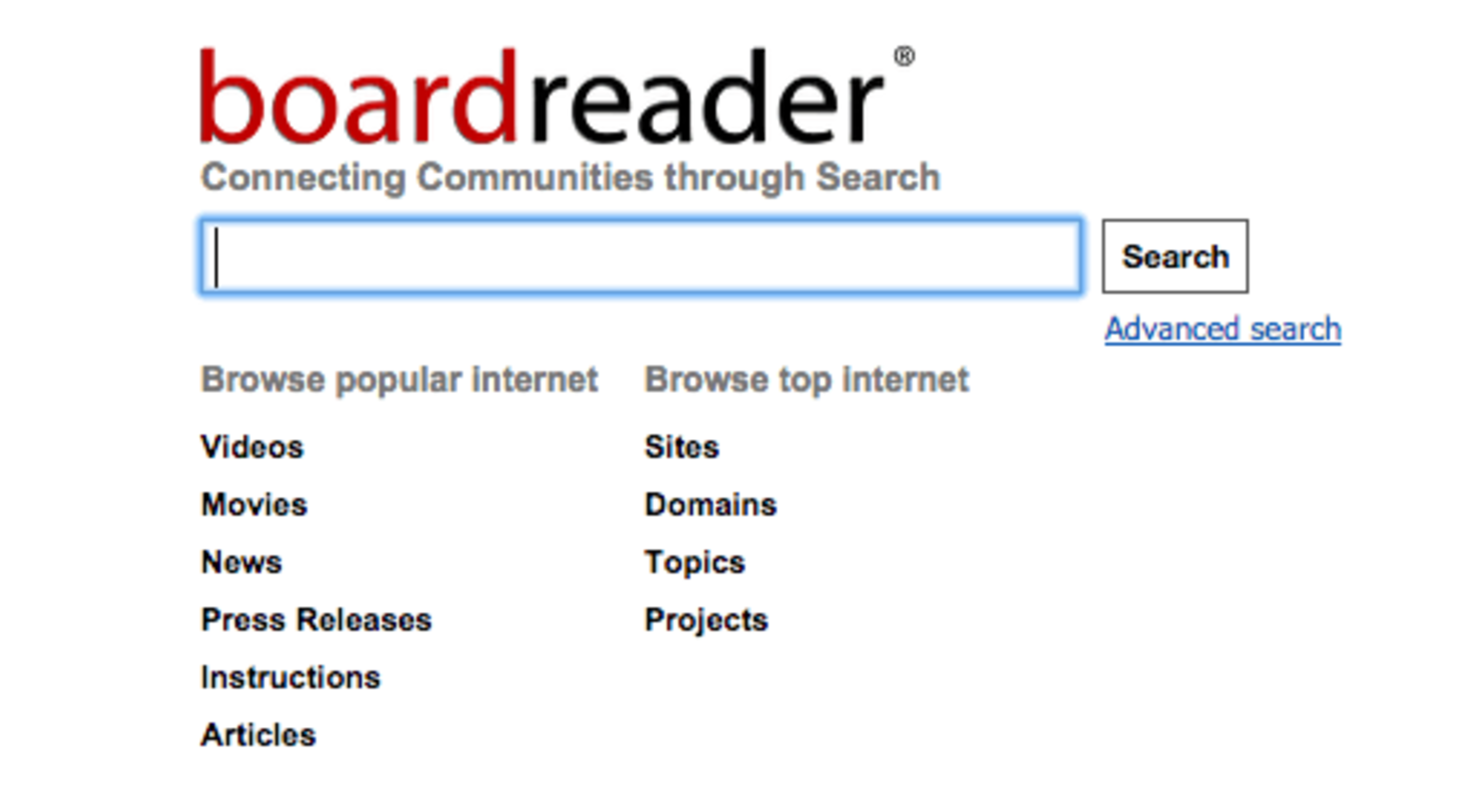
Google Alerts lets you set up notifications for any search terms you want. You can even set up real-time alerts to make immediate changes.
Conclusion
If you've never examined your online reputation before, you may have some work ahead of you. However, dictating how you're perceived online is one of the most important things you can control. If you feel overwhelmed by the steps in this guide, take it slow. Some progress is better than none!
A reputation can make or break your brand. Local businesses are greatly affected by positive and negative reviews, and online content can have permanent professional and academic effects on individuals. In order to thrive in an increasingly digital world, you must be aware of your online reputation and take the steps to influence and maintain what people can read about you. Online reputation management takes dedication and hard work, but can make the difference in your long-term success.
During this process, remember that search engines do not change results overnight. It can take up to several months to see some of these efforts come to fruition. So the sooner you get started, the better off you'll be!
Amanda RonanAuthor
Amanda Ronan is a contributing author for Expertise.com, and is a Community Editor for Round Table Companies, a creative agency that helps build brand reputation through storytelling. She has over 12 years experience as a teacher in applied language education, and is a graduate of Loyola Marymount University with a Master’s Degree in Education.




